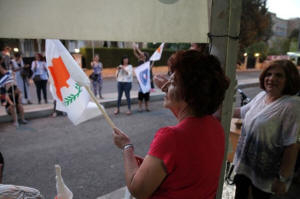|
'We were so close,' says diplomat as
another Cyprus reunification bid flops
 Send a link to a friend
Send a link to a friend
 [July 07, 2017]
By Michele Kambas [July 07, 2017]
By Michele Kambas
ATHENS (Reuters) - The best chance in
generations to broker a deal over ethnically-split Cyprus collapsed in
acrimony early on Friday, throwing the prospect of any reunification
into disarray.
A week of U.N.-mediated talks in the Swiss Alps culminated in a "yelling
and drama" session, leaving unresolved a conflict that keeps Greece and
Turkey at loggerheads and is a perennial obstacle to Ankara's hopes of
joining the European Union.
Cyprus's Greek and Turkish Cypriots have lived estranged since a Turkish
invasion in 1974 triggered by a brief Greek inspired coup. Major natural
gas discoveries in the region over the past decade had added impetus to
efforts to secure a deal.
Turkey has 30,000 troops stationed in northern Cyprus and their status
in any post-settlement peace deal proved to be the undoing of a process
one diplomat lamented came "so, so close" to succeeding.
Diplomats said Turkey had appeared to be offering little to Greek
Cypriots wanting a full withdrawal of Turkish troops from the island.

Indications which had emerged on Thursday that Turkey was considering
relinquishing intervention rights vanished when the Greek side asked for
that commitment in writing.
The Greek Cypriots had indicated readiness to make concessions on
Turkish Cypriot demands for a rotating presidency, the other key issue.
"I don't know where it may go from here," a diplomatic source told
Reuters.
That source found fault with Turkish Cypriots for being "a bit greedy"
and "overplaying their hand", but also Greek Cypriots, who possibly made
a tactical error in asking for a written commitment from Turkey
relinquishing its intervention rights before a deal had been agreed.
"I just don't think there is a sense of trust there. We were really,
really close," the diplomatic source added.
Cyprus talks have collapsed before, most spectacularly in 2004, when
Greek Cypriots rejected a U.N. reunification blueprint in a referendum
while Turkish Cypriots backed it.
[to top of second column] |

A Greek Cypriot woman waves a Cypriot flag during a protest against
positions put forward by President Nicos Anastasiades in peace
talks, at Ledra Palace checkpoint in the UN-controlled buffer zone
in Nicosia, Cyprus July 6, 2017. REUTERS/Yiannis Kourtoglou

On that occasion, it took several years for the United Nations to
re-engage.
NEXT STEPS?
Britain, a guarantor power of Cyprus under a convoluted treaty which
gave the island independence in 1960, said it was "enormously
disappointed".
"Now is a time for calm reflection and consideration of next steps.
Our commitment to a deal remains unwavering," a British government
spokesperson said.
A downcast Antonio Guterres, the United Nations Secretary-General,
who had flown in on Thursday to help clinch a deal, said the world
body remained at the disposal of the sides to facilitate any future
engagement.
"The conference is closed," he said. "That doesn't mean that other
initiatives cannot be developed to address the Cyprus problem."
Quite what that means is unclear. Turkish Foreign Minister Mevlut
Cavusoglu said the outcome showed the "impossibility of a solution
within the parameters of the U.N. good offices mission".
"There is now no sense in insisting on these parameters," he said.
The Cyprus problem has been on the United Nations agenda for more
than half a century.
(Reporting By Michele Kambas; Editing by Gareth Jones)
[© 2017 Thomson Reuters. All rights
reserved.]
Copyright 2017 Reuters. All rights reserved. This material may not be published,
broadcast, rewritten or redistributed.

 |